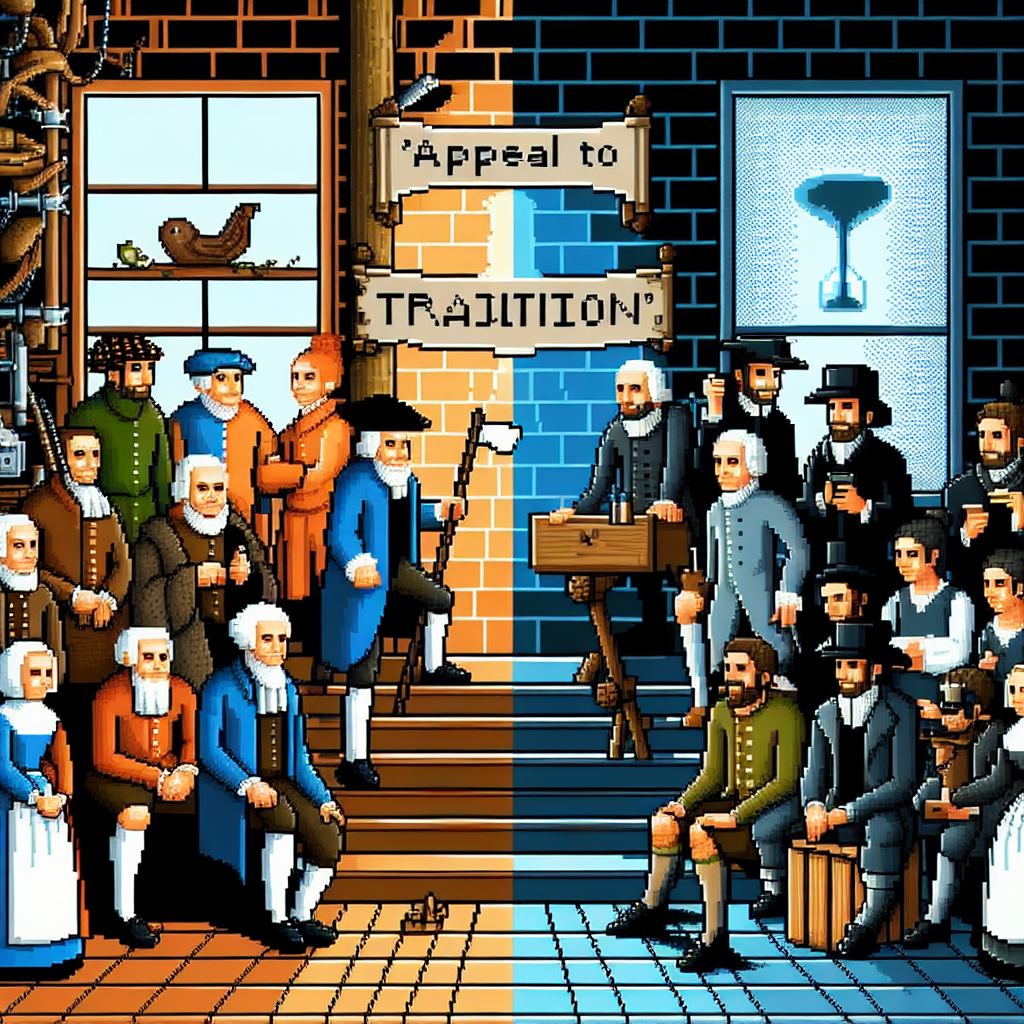Logical Fallacy: Introduction
Definition of a Logical Fallacy
A Logical Fallacy is a flaw in reasoning or a mistaken belief that undermines the logic of an argument. These errors in argumentation are deceptive and can lead to incorrect conclusions, which is why they are important to identify and understand.
Importance of Understanding Logical Fallacies in Arguments
Understanding and identifying logical fallacies is crucial because it empowers individuals to engage in well-reasoned debates and discussions. When fallacies are present, arguments can become skewed, leading to decisions that are not based on sound logic. Additionally, being aware of these pitfalls helps in building stronger and more convincing arguments.
Overview of the “Appeal to Tradition” Fallacy
The “Appeal to Tradition” fallacy is a common type of logical fallacy that occurs when something is deemed correct or better simply because it is traditional or has been established over time. This fallacy often ignores logical reasoning and evidence, thus making it essential to question and critically evaluate such assertions. Understanding this specific fallacy is particularly important as it frequently influences decisions, from cultural practices to business strategies, during discussions or debates.
Logical Fallacy: Understanding the Appeal to Tradition
Definition and Explanation
The Appeal to Tradition is a type of Logical Fallacy where something is considered correct or better simply because it is older or has been done for a long time. This fallacy relies on the assumption that if an idea or practice has historical roots, it must inherently have merit. However, this assumption ignores the fact that not all traditions have valid foundations or are relevant in modern contexts.
Historical Context and Origins
The origins of the Appeal to Tradition can be traced back to societies that placed heavy importance on customs and norms for their stability and continuity. During times when change was often met with resistance, traditions provided a sense of security and predictability. Despite the past’s emphasis on preserving customs, the relevance of these traditions in today’s dynamic and fast-evolving world is sometimes questioned.
Common Misconceptions
A common misconception about the Appeal to Tradition is that it completely dismisses the value of traditions. In reality, this fallacy does not imply that all traditions lack value; rather, it highlights the risk of assuming that age alone validates an idea or practice. Understanding this distinction is critical because it allows us to discern when traditions are beneficial and when they may hinder growth and progress.
Logical Fallacy: Identifying the Appeal to Tradition Fallacy
Key Characteristics and Indicators
The Appeal to Tradition logical fallacy occurs when an argument relies on tradition as the sole reason for its validity. This fallacy suggests that because something has always been done a certain way, it should continue to be done that way. Additionally, it often appears in arguments lacking substantial evidence, relying instead on history or longevity alone. Identifying this fallacy requires recognizing these arguments during discussions.
Examples in Everyday Life
In everyday life, the Appeal to Tradition can manifest in various contexts. For instance, someone might argue that a specific holiday should be celebrated in an outdated manner because that’s how it has always been done. Similarly, a company might resist adopting new technologies, insisting that their current methods have historically worked well. By identifying these examples, one can begin to see the logical fallacy at play in decisions impeded by tradition.
Illustration Through Popular Culture or Current Events
Popular culture and current events provide ample examples of this logical fallacy. Consider debates over educational curriculums; some argue against modern teaching methods because traditional approaches have been successful in the past. In films and television, characters might resist change solely to preserve what is known and comfortable. These portrayals highlight how the Appeal to Tradition impacts perspectives and decisions, prompting individuals to question why tradition is sometimes favored over progress.
Logical Fallacy: The Impact of the Appeal to Tradition Fallacy
Consequences in Decision Making
The Appeal to Tradition fallacy can lead to decisions that lack a solid foundation, as it relies heavily on past practices without evaluating their current relevance or effectiveness. Because decision-makers often cling to traditional methods, they may overlook more efficient or innovative solutions.
Effects on Innovation and Progress
Additionally, this logical fallacy can significantly stifle innovation and progress. People might resist change because they are more comfortable with longstanding practices, despite evidence that new approaches could yield better results. As a result, societies may fail to adopt new technologies or ideas that could improve overall quality of life.
Influence on Social and Cultural Norms
During the development of social and cultural norms, the Appeal to Tradition plays a critical role. Traditions rooted in outdated ideologies may persist, impacting social dynamics and cultural evolution negatively. Despite the importance of preserving heritage, blind adherence to tradition can prevent the acceptance of diverse perspectives and new customs, ultimately hindering societal growth. Understanding and addressing this logical fallacy is crucial for fostering a more open-minded and progressive culture.
How to Avoid the Appeal to Tradition Logical Fallacy
Critical Thinking and Questioning Assumptions
To effectively guard against the Appeal to Tradition logical fallacy, it is crucial to engage in critical thinking while continually questioning established assumptions. This involves actively examining whether traditions hold valid reasoning by asking why a certain belief or practice exists. Although tradition provides a sense of continuity, questioning its relevance helps reveal if it aligns with current understanding.
Evaluating Arguments Based on Evidence
It is essential to base arguments on evidence rather than tradition alone. This involves critically assessing the reasoning behind a claim, ensuring it’s supported by factual evidence rather than solely by its existence or duration. By doing so, individuals can avoid being swayed by tradition simply because it has always been a certain way.
Encouraging Open-mindedness and Innovation
Additionally, encouraging an open-minded approach helps circumvent the potential impact of this logical fallacy. Being receptive to new ideas and innovations is crucial for personal growth and the advancement of society. This openness often leads to novel solutions and improvements that might have been suppressed otherwise by rigid adherence to tradition. Consequently, embracing change fosters an environment where innovation thrives.
Understanding Logical Fallacies
Enhancing Persuasive Communication
Recognizing a Logical Fallacy, such as the appeal to tradition, significantly improves communication skills. Before launching into an argument, one must understand the logical structure and identify any fallacies that might weaken the argument’s basis. This awareness not only prevents the use of such fallacies but also increases the credibility of the speaker.
Improving Problem-solving Skills
Logical fallacies often obscure the real issues. By learning to detect them, individuals can focus on evidence-based solutions and avoid paths that lead nowhere. This is particularly important during collaborative problem-solving, where faulty reasoning can stall progress and cause stakeholders to become fixated on solutions that lack substance.
Strengthening Logical Reasoning and Critical Analysis Skills
Understanding fallacies fosters a more analytical mindset. This not only helps to question assumptions but also facilitates better decision-making based on logical reasoning. Despite the allure of tradition, questioning its relevance leads to a deeper analysis of why certain practices are upheld. This scrutiny opens the door to innovation, allowing for solutions that are more adaptable to the changing environment.
Case Study on Logical Fallacy: Appeal to Tradition in Business Decision Making
Background
In the rapidly evolving world of business, the Appeal to Tradition fallacy frequently surfaces, particularly when companies cling to outdated practices. This Logical Fallacy occurs when an argument is deemed right merely because it is longstanding. For instance, a traditional family-run publishing firm faced declining sales. The management insisted on using established brick-and-mortar distribution channels, arguing they were the backbone of the organization’s success for over a century.
Problem Identification
The core issue stemmed from the management’s reluctance to adapt to digital transformation. Consequently, they ignored the booming trend of online sales. Their belief that “it has always worked this way” led to a significant loss of market share. This traditionalist stance deterred any potential innovation that could have rejuvenated the business model.
Analysis
By adhering to the Appeal to Tradition fallacy, the company failed to acknowledge changing consumer behaviors and emerging technologies. Additionally, they missed opportunities to engage with younger, tech-savvy audiences who predominantly purchase books online. The firm’s inability to pivot became a significant handicap, as competitors who embraced digital platforms thrived.
Solution
To overcome this fallacy, a reorientation was necessary. The management initiated a digital strategy task force. They extensively researched current market trends and conducted surveys to understand customer preferences better. By integrating a robust e-commerce platform alongside their traditional channels, they appealed to a broader audience. Further, they embraced digital marketing strategies, reaching new customers through social media and online campaigns.
Outcome
This multifaceted approach resulted in a significant turnaround, as online sales boosted overall revenue within a few quarters. The company retained traditional values while ensuring they did not impede progress. By challenging long-held assumptions and incorporating new ideas, they successfully navigated around the Appeal to Tradition fallacy, illustrating a harmonious blend of tradition and innovation. Their story exemplifies how critically evaluating assumptions and embracing change can lead to sustained success.

